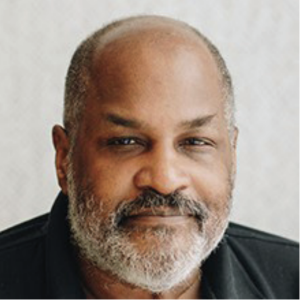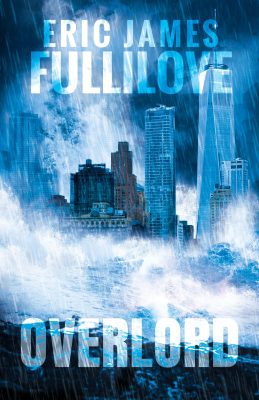Back to the Indie Corner series

Today I chat with Eric James Fullilove, author of Overlord (Atmosphere Press), a climate change speculative fiction novel. Eric James Fullilove is an MIT graduate, CPA, and published author. He has worked in mainstream media (CBS, Young and Rubicam advertising, and Scholastic, the children’s book publisher) as well as in various non-profit organizations dealing with homelessness and HIV (Housing Works) global poverty and displaced persons (World Vision) child development (Boys and Girls Clubs), as well as promoting effective solutions to global poverty problems (Innovations for Poverty Action). He has traveled extensively while working to support global causes in the developing world, having visited over 60 countries in Africa, Asia, and Central and South America. He currently resides in North Carolina where he is at work on his next novel.
From Atmosphere Press:
In a chilling and thought-provoking glimpse of a terrifying near-future, author Eric Fullilove’s Overlord explores the catastrophic consequences of climate change if it were to happen tomorrow…Full of heart-stopping action and heart-wrenching moments, Overlord is a haunting exploration of a possible future that will leave readers questioning the impact of climate change on our planet and our way of life.
Mary: Hi Eric! Tell us about yourself—your life so far and how you got started in writing. What else have you published besides Overlord?
Eric: I am an MIT graduate, a CPA, and have published a number of books, primarily in the sci-fi and thriller categories. After a lengthy work career in media and advertising, for the last decade and a half I’ve worked with non-profits in senior roles to address poverty and child well-being globally.
I started writing thirty years ago and was discovered by an agency that looked for new authors; I’d written a short story, which someone optioned for a script for a movie (that never went anywhere) and I thought I could write a book faster than I could get anything produced. The 1992 movie The Player with Tim Robbins influenced that decision as there is a line in the movie where Tim Robbins, as the head of a major studio, says “we get pitched 50,000 times a year. On average, we can say yes to 10 of them.”
I was like, those odds suck! Then I was discovered and got a two-book deal with Bantam Spectra and that was my start. My first novel, Circle of One, was published in 1995 and I’ve been writing on and off ever since.
Mary: Tell us something about your newest novel, Overlord. Who is the intended audience, and what’s going on in the story?
 Eric: Overlord is about rapid onset climate change, where catastrophic events affect the United States in a matter of a few years, not decades. A new underclass of displaced people (both the east and west coasts are underwater) called “coasties” is created, and they are are effectively imprisoned and put to work because they have no property and therefore no rights.
Eric: Overlord is about rapid onset climate change, where catastrophic events affect the United States in a matter of a few years, not decades. A new underclass of displaced people (both the east and west coasts are underwater) called “coasties” is created, and they are are effectively imprisoned and put to work because they have no property and therefore no rights.
The novel focuses on a particular crew of coasties, led by an ex-Miami police officer named Madison Cervantes, who are tasked with doing salvage work in the Gulf and elsewhere in service of the new, totalitarian government that runs things. The novel opens with Madison and her crew putting out a fire on an abandoned oil rig in the Gulf ahead of an approaching major hurricane; just for laughs, the rig is surrounded by a new apex predator. So if the fire doesn’t get them, if they don’t drown from the storm, maybe they’ll be eaten by the beasties when their ammo runs out.
Each of the character’s backstories is interwoven with the initial action, so that we understand exactly what’s happened with the catastrophic climate change and how they came to be there, and what the government really wants them to do.
It’s a fun ride, with lots to think about, and lots to be terrified about.
Mary: What sorts of ecological themes does your novel have, and how were you inspired to write about them?
Eric: I think what I want readers to take from this (and why I positioned this in the US in the immediate future, not fifty years from now) is that we must take climate change seriously, because once we pass the tipping point, there’s no going back. I want people to understand that what we are seeing now, extreme weather events in the US, is nothing compared to what our next generation will see, and unless we get serious about climate change now, the generation that has to pay the price for our folly will suffer immense damage as a result of our inaction.
The climate change science in Overlord is not intended to be a precursor to anything that will actually happen; it’s just showing a disastrous result accelerated into the present so that people will understand how screwed we are when sea levels rise enough to have any of the effects depicted in the novel.
Mary: Are you planning on any book fairs or talks?
Eric: 2024 is a new year, and I am putting together a schedule of appearances to support the novel. On January 11, Atmosphere Press had an author event featuring myself and two other esteemed authors, and I will advise people of new events as they are scheduled.
Mary: Are you working on anything else right now, and do you want to add other thoughts about your book?
Eric: I am working on a sequel to Overlord, but my next novel from Atmosphere will be View to a Kill, which goes back to the world of my first novel, Circle of One.
Mary: Thanks so much for sharing the book with Dragonfly, and we wish you the best of luck in getting this novel (with important messaging about climate change) out in the world.